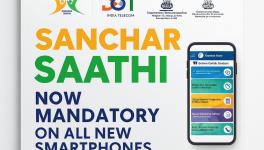TikTok: Trump Helps Microsoft in Discount Shopping
Donald Trump and Microsoft CEO Satya Nadella spoke over the weekend and decided that Microsoft would pursue its effort to buy TiKTok's US, Canada, Australia, and New Zealand operations. TikTok is owned by Bytedance, a Chinese company. The ostensible reason for the “severance” is “national security”.
In India too, TikTok was banned along with 58 other Chinese apps by the Government of India on June 29, because it was "prejudicial to sovereignty and integrity of India, defence of India, security of state and public order”. The social media short-video platform, which was rapidly adopted by the not-so-affluent sections of society, might find a new lease of life in India if the Microsoft deal goes through.
The Indian government might revoke the ban when the management of the platform is transferred to the US. In the unlikely event of the deal falling through, Facebook Instagram might get some additional traffic, but alternatives such as India-based app Roposo, Zili from Xiaomi Corporation, and Dubsmash app based in the US have seen huge increases in downloads, according to a report in Fast Company.
Talks between Microsoft and Bytedance were under way for the purchase of TikTok even before Trump started railing at it. Trump had ratcheted up this diatribe against TikTok in recent weeks. He wanted the mobile app banned in the US by September 15. This latest move to get Microsoft to buy TikTok, is the president’s attempt to circumvent fraught legal hurdles if he went in for a ban on it instead.
For Nadella, TikTok being in a tight spot provides a blatant advantage that can only drive down the price tag for the platform.
“The latest stats cannot lie: 800 million users worldwide, 1.5 billion downloads. As detailed in our
October 2019 study published by the Washington Post, Tiktok is becoming a global
force and it is now a strong Instagram competitor.”
A petty attack on a social media platform owned by a Chinese company might bring a vindictive Trump a few brownie points, but is unlikely to arrest his dwindling popularity. But at a more substantive level, the move could further damage the country’s reputation for it’s arbitrary business practices, under an unpredictable head of state. Given Trump’s petty and bizarre behaviour right through his presidency, it might not be considered ridiculous to believe that the real reason for him to go after TikTok is that he is irked by the many TikTok videos by young Americans that have mocked him, especially after the death of former presidential candidate Herman Cain of COVID-19 on July 30, who was hospitalised with the disease days after attending Trump's indoor rally in Tulsa, Oklahoma, on June 20. Trump has also led the attack on Huawei, another Chinese company, calling it a security risk as well.
Also read: The US Tech War on China and the 5G Battlefield
For Nadella’s Microsoft, it is yet another attempt to get a firmer footing in the consumer space, since it’s focus over the past few years has been on the needs of business users. TikTok’s current popularity might give it more than a foothold in the social media space, by setting up a direct battle with Facebook’s Instagram. The purchase might give the company a chance to compete with the other social media majors as well, but given Google’s inability to get its own success story with a social media product, this buy is not going to guarantee success for Microsoft. It does own LinkedIn, a platform for professionals, thus by definition catering to a niche audience, unlike the less affluent, mass audience TikTok attracts. Its messaging application, Skype, has only seen limited success.
The substantive point in this whole saga is the the arm twisting of a non-American company into selling itself to an American company. The accusation, still unproven, is that the Chinese company sells data to third parties and that the data is also available to the Communist Party of China. The platform is at worst no different or may even be better than its competition, specifically, Facebook-owned Snapchat-- which if it can be shown by reputed institution--can lead to a shift in preference for advertisers on these platforms.
“During the coronavirus lockdown, downloads of TikTok saw a sharp increase particularly in India, while its US unique visitors jumped up nearly 50% since January.”
Eliot Anderson, a French ethical hacker, in the first of a promised series on the looking into the workings of TikTok software, published on August 3 a piece, which basically shows that there is not significant network activity or data transferred from the app to any location in China to establish that the app leaks data to Chinese authorities. Even if this is a preliminary enquiry, and more proof is necessary, TikTok has been on record to talk to authorities in the US or elsewhere to allay such fears. Besides, it if an ethical hacker is capable of prima facie establishing that there does not appear to be any foundation for such fears, it is quite likely that government agencies can establish it too.
The concern for privacy in the mobile ecosystem is a larger concern that cannot be sidetracked by xenophobic, ideological or outright business interests. Privacy is a concern if user data resides in corporate hands without accountability as much as if it lies with the Communist Party of China.
Whitney Merrill in a Twitter thread on June 29, said that TikTok on the Android OS-based mobile devices does not look into more user data than other apps in the mobile device.
Overall Tiktok topped a new record with 315 million downloads (on App Store and
Google Play combined) for the first 2020 quarter.
What it eventually boils down to is when like the other social media platforms, especially Instagram, does TikTok offer itself as a reliable platform to advertise. A New York-based organisation named Ghost Data in an analysis of TikTok and Instagram to check which of the platforms dealt better with the problem of spambots and fake video views, concludes that TikTok did a better job of minimising the impact of spambots on its platform and also responded better when they are detected.
According to the analysis, “TikTok made considerable efforts to keep its platform “clean”.” The report quotes a Bloomberg article to say that “in 2019, Instagram earned more than YouTube with advertising sales.” But in the face of a rival that is better placed to reduce spambots and fake video views, Instagram is faced with a real challenge, especially when the popularity of TikTok is growing exponentially.
The real story thus is, when all this grandstanding and arm twisting is done, Microsoft will have bought a better platform, which is rapidly growing and with footprint across the world, at a heavily discounted price, based on the potentially dangerous prospect of personal data of people in democratic countries being in the hands of the Communist Party of China.
Also read: Global Capital, Digital Monopolies and New Forms of Enclosure
Get the latest reports & analysis with people's perspective on Protests, movements & deep analytical videos, discussions of the current affairs in your Telegram app. Subscribe to NewsClick's Telegram channel & get Real-Time updates on stories, as they get published on our website.























